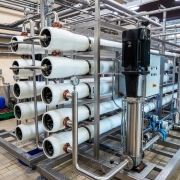Why Proper Cooling & Boiler Water Treatment Matters: The Role of Water Treatment Systems in Industrial Water
Water plays a crucial role in industrial operations, particularly in cooling and boiler systems. However, without proper treatment, water can cause significant operational challenges, including scaling, corrosion, and microbial growth. Implementing a comprehensive water treatment system is essential for maintaining efficiency, extending equipment life, and ensuring compliance with safety and environmental regulations. Here’s why proper cooling and boiler water treatment matters and how advanced water treatment solutions play a vital role in industrial water management.
The Importance of Cooling Water Treatment
Cooling systems, such as cooling towers and heat exchangers, are critical for maintaining optimal temperatures in industrial processes. However, untreated water can lead to several issues:
- Scaling: Minerals like calcium and magnesium can precipitate and form scale, reducing heat transfer efficiency and increasing energy costs.
- Corrosion: Oxygen and acidic conditions can lead to rust and metal degradation, compromising system integrity.
- Biological Growth: Bacteria, algae, and biofilms can thrive in untreated water, leading to blockages, health hazards, and reduced efficiency.
- Fouling: Accumulation of dirt, debris, and other contaminants can hinder performance and require costly maintenance.
The Role of Water Treatment Systems in Cooling Systems
Advanced water treatment solutions help mitigate these issues by:
- Filtration Systems: Removing suspended solids, sediments, and particulates to prevent fouling and clogging.
- Reverse Osmosis (RO) and Ultrafiltration: Eliminating minerals and contaminants that cause scaling and corrosion.
- Ultraviolet (UV) Disinfection: Controlling microbial growth without the use of chemicals.
- Electrolytic and Magnetic Water Treatment: Preventing scale formation and reducing mineral deposits naturally.
By utilizing a well-designed water treatment system, industries can improve cooling efficiency, reduce downtime, and extend equipment lifespan without relying on chemical additives.
The Importance of Boiler Water Treatment
Boilers are used in various industries to generate steam for heating, power generation, and industrial processes. However, untreated boiler water can lead to:
- Scale Formation: Deposits on boiler tubes reduce heat transfer, increasing fuel consumption and the risk of overheating.
- Corrosion: Oxygen and acidic conditions can weaken boiler components, leading to failures and costly repairs.
- Foaming and Carryover: Impurities in water can cause foaming, leading to steam contamination and reduced boiler efficiency.
- Sludge Accumulation: Suspended solids can settle at the bottom of the boiler, reducing efficiency and increasing maintenance needs.
The Role of Water Treatment Systems in Boiler Systems
Effective water treatment solutions for boilers include:
- Deionization and Reverse Osmosis: Removing dissolved minerals to prevent scaling and corrosion.
- Mechanical Filtration: Capturing particulates and impurities that contribute to sludge buildup.
- Deaeration Systems: Removing dissolved oxygen to prevent corrosion.
- Condensate Recovery Systems: Recycling and purifying steam condensate to enhance efficiency and reduce water waste.
A proper water treatment system ensures that boilers operate efficiently, reduce fuel and maintenance costs, and comply with industry standards without relying on chemical treatments.
Conclusion
Proper cooling and boiler water treatment is essential for industrial operations to prevent scaling, corrosion, and biological contamination. Implementing advanced water treatment systems plays a key role in maintaining system efficiency, reducing operational costs, and extending equipment lifespan. By investing in innovative water treatment solutions, industries can ensure reliable and sustainable operations while minimizing environmental impact and reducing dependency on chemical additives.


